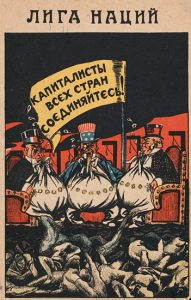By Luke Stanek
The word “capitalism” is used constantly in contemporary American political discourse, mostly with positive connotation, to describe either the American system of governance and economics, or some ideal to attain through that system. But when the word originally arrived on American shores, it was met with worry and caution, and even rejected by President Hoover as a negative term. So how did the word transform from a negative to positive connotation, and how do we define it in order to better understand how it was used in the past and how it is used today? Steven Marks suggests that we look to Russia to help answer both of these questions.
On Monday, November 7th, Dr. Marks, professor of History at Clemson University and a Miami alumnus, delivered the final lecture in this year’s Havighurst Colloquia Series, which focused on the etymology of the term “capitalism” and its usage in American and global political discourse. Marks argued that our mainstream understanding of “capitalism” is conditioned by a fear of communism, and that to understand the concept we must understand how it first came into popular use. Coined in the 1850s, the term was first popularized by Russian populists in the 1870s to describe the system of economics and governance used by Western Europe and other imperial powers as something that was a danger to traditional folkways. After the Russian Revolution of 1917, the term quickly became one half of a dichotomy: the West’s “capitalism” to Russia’s “communism.” It was in this sense that America was first exposed to the term, and it came to dominate our understanding of “capitalism” throughout the 20th century.
Marks examined letters, newspaper articles, and speeches from prominent Americans who used the word “capitalism” and found that in virtually every case, it was used with direct reference to Russia or communism, tinged with fear. It was this fear—a fear of slipping towards a communist system—that transformed “capitalism” into a bastion of Americanism in the way that industrialism or the “free market” had served previously. Marks discussed part of the transformation from negative to positive through the “People’s Capitalism” campaign, which sought to soften the term and appropriate it for American use. If Bolshevism was the menace, then capitalism was the savior. On the flipside of the coin, Marks notes in his 2004 book How Russia Shaped the Modern World that to anti-Westerns, Communist Russia was “the embodiment of higher truth, the bearer of light from the exotic East” and would thus serve as a bastion of anti-Americanism and anti-Westernism, and in that respect, anti-capitalism.[1] This dichotomy became particularly pronounced during the Cold War, and the terms “capitalism” and “communism” increasingly became catch-alls for the systems and ways of life of the two respective superpowers, used prolifically by both systems’ governments and people.
But even after the fall of the Soviet Union and the “Bolshevik menace,” capitalism continued to be used in contrast to communism. As Marks noted, after the fall of the USSR, George H. W. Bush said that “capitalism builds upon human nature. Communism didn’t.” Additionally, Marks argued that the idea that government intervention in the economy was anti-capitalist and a slippery slope toward communism (an idea popularized by Ayn Rand) continued to influence policy, including the deregulation of the financial industry and dismantling of the welfare system that was built to address the communist threat. But without a dichotomous counterpart, Marks questioned whether or not the term should be used so haphazardly, and suggested that we should redefine it for what it is, rather than what it is not. For Marks, what capitalism is is a system in which there are free flows of information. The slippery slope, then, is not government intervention, but lack of transparency in that intervention: to the public, and to the world.
Just as Peter Holquist suggested in his lecture last month that we should give credit to Russia for coining the term “crimes against humanity,” Marks suggested that we should give credit to Russia for coining the term “capitalism”: as his lecture title indicated, the word represents the USSR’s “gift” to America. Whether or not we agree with his new definition of “capitalism,” his lecture at least provokes the mind to question one of the most ubiquitous words in political discourse, rarely questioned as it is. If one finds Marks’ new definition intriguing, then they should pick up a copy of his recently-published book on the subject: The Information Nexus, and read about it in greater detail.
[1] Steven Marks, How Russia Shaped the Modern World: From Art to Anti-Semitism, Ballet to Bolshevism (Princeton, NJ: Princeton University Press, 2004), 275.
Luke Stanek is a second-year MA student in History.

